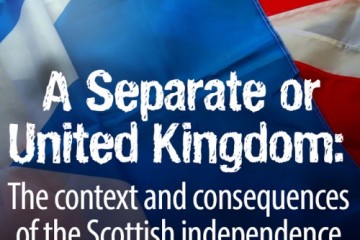
Our series on the Scottish referendum: things to keep in mind for tomorrow
In advance of the vote tomorrow, which will decide the fate of the three-centuries-old voluntary union between Scotland and England, the outcome is far from a foregone conclusion. The Politics in Spires blog series ‘A Separate or United Kingdom’ has attempted to contribute to an expanded discussion of the independence debate with voices from across the social sciences, including law, economics, sociology, psychology, human geography, political philosophy, and more. Much of the popular discussion has centred on the fiscal and economic consequences of separation. Prof Simon Wren-Lewis agrees with the UK Treasury that in the next decade, at least, Scottish people ‘will be significantly better off by staying in the Union’. Wren-Lewis warns that independence would involve high set-up costs which would …

Scotland: whoever wins, the public loses
The result of the referendum on 18 September is very uncertain, but its effects have already been felt. Whichever side wins, and whichever path the Scottish people chooses, the real loser of the long referendum campaign has been the quality of public debate, both in Scotland and south of the border. This is not meant as a trivial slight at any irrationality on the part of Scottish voters, or excessive rambunctiousness in the public demeanour of partisans of ‘Yes Scotland’ or ‘Better Together’. If anything, it is to be applauded that the debate has galvanised such high levels of engagement among the Scottish public, culminating in an expected turnout for the referendum of as much as 80%. Instead, it is more a comment that in the supposed contest between ‘head’ and ‘heart’ reasons for which way to vote, it has generally been the very worst aspects of both that have prevailed over their better, and more useful, fellow-arguments. The debate over Scotland’s future has, especially recently, served up the incongruous (and unromantic) image of a nation of ‘bean-counters’ basing its decision about independence on the expected profitability of either outcome, yet calculating this expectation (on either side) off the back of political and economic assumptions that resemble nothing so much as declarations of blind fear or faith.

City-regional small nations beyond nation-states
With separate histories and political-cultural traditions, the UK and Spain do not have the same nation-state DNA. Yet both face issues over regional independence. While the UK Government has legitimised the Scottish Government and supported the Scottish Independence referendum as a highly democratic exercise, Spain stands out as remaining normatively inflexible without, so far, even contemplating any dialogue with the presidents of the Catalan and Basque Autonomies.
Other EU nation-states accept the UK’s approach to sort out regional and nationalistic claims democratically. But Spain has been avoiding the demands of the Catalan and Basque institutions and citizens on the basis of both historic and more recent episodes of political unrest. As a result, it seems impossible to open any discussion about the devolution claims of city-regional small nations, particularly in terms of devising an internal, alternative and re-scaled configuration of Spain as a nation-state, which would involve modifying the 1978 Constitution. In the case of the Basque Country, this is presented as the least likely outcome as political violence in the region has been both a major obstacle and also a source of inertia. Nevertheless, ETA (Euskadi Ta Askatasuna)[1], announced a ‘definitive cessation’ of its campaign in 2011 and, therefore, should welcome any kind of democratic implementation that involves devolving powers to the Basque Country.
But are there any remarkable differences between EU nation-states such as the UK and Spain?
Indeed, I think there are plenty of them.

(Under)taxation of North Sea Oil and Gas Production and its Implications for Scottish Independence
The Guardian newspaper recently published an article by Aditya Chakrabortty entitled ‘Dude, where’s my North Sea oil money?’ (13 January 2014), which drew a comparison between Norway and the UK in terms of what approximately four decades’ worth of fiscal income from oil and gas production has meant for each country. The main thrust of the article was to suggest that the reason why the UK does not have a colossal nest egg like Norway’s is that the UK government effectively squandered its windfall in tax breaks. That is true, but not in the way Chakrabortty thinks.
Starting in 1981, once the Falklands conflict (and the need to pay for it) was over, the UK government led by Margaret Thatcher embarked on a process (which accelerated greatly under John Major and even more so under the Blair-Brown Labour governments) of levying progressively less and less taxes on oil and gas exploration and production activities. In other words, Chakrabortty is right in saying that most of the windfall was squandered in tax breaks but, overwhelmingly, the main recipient of these tax breaks was the UK oil and gas industry. As oil prices have skyrocketed from 2000 onwards, the differences in the amounts that the UK levies compared to other large North Sea producers (and not only Norway) have reached astonishing proportions.

What happens to Scotland’s Westminster MPs after a ‘yes’ vote?
On 25 March this year, a bill disenfranchising around 4 million people was introduced to Parliament. It barely received any press coverage, and though it was defeated it raised an important and oddly neglected constitutional question.
The bill in question was proposed by Tory John Stevenson, and asked “that leave be given to bring in a Bill to amend the Representation of the People Act 1983 to disenfranchise all residents of Scotland eligible to vote in any United Kingdom General Election held after 18 September 2014 in the event of a positive vote in the Scottish Independence referendum; and for connected purposes.”[1] It attempts to solve an anomaly caused by the electoral calendar: Scotland votes on independence on 18 September this year, but would only become an independent nation some time in 2016 (the Scottish government is planning for 24 March[2]). In between those two dates, of course, the UK will hold a general election. Some Conservatives argue that Scots shouldn’t return MPs to Westminster in 2015 because most laws passed by the 2015 Parliament will not apply to Scotland. The problem is exacerbated by the Labour Party’s dominance in Scottish constituencies: 2015 could well see a Labour majority in Westminster and a Conservative majority in ‘rump UK’, i.e. the United Kingdom minus Scotland. In this situation – one of the most likely outcomes of the general election – by whom would Britain be governed?

The misguided search for the political – Lois McNay
Max Muir speaks to Lois McNay, Professor of Political Theory at Oxford University and Fellow of Somerville College, about her new book, ‘The Misguided Search for the Political’. She argues that radical democratic theorists, in their search for the abstract essence of politics itself, have ushered in a dangerous silence on the lived experience of inequality and oppression. Without addressing the ‘social weightlessness’ of their theories, these radical democrats find their emancipatory credentials seriously undermined. Max Muir: Hi Lois, thanks for chatting with us. Your new book is called ‘The Misguided Search for the Political’. Why exactly is that search misguided? Lois McNay: The book is a reaction to something we’ve seen over the last twenty or thirty years in …

Personality Prevails: A political psychology perspective on the Scottish independence referendum
As the Scottish independence referendum campaign enters its final stages, both sides will still be hoping that they can persuade as many voters as possible that their side is right. Although undoubtedly some voters are still to decide which way they will vote, the minds of most voters were made up long ago and the campaign will have made little difference. Political psychologists have convincingly shown that voters aren’t particularly good at making objective assessments of arguments about political issues – regardless of their actual validity, we tend to think that arguments that support our positions are good and arguments that don’t are bad. Even when voters have the same factual information, partisan bias leads to very different conclusions. The stability of the referendum polls despite the long and intense campaign suggests that these factors are almost certainly playing an important role in opinions on the independence debate.
If vote intentions in the referendum aren’t a result of objective evaluations of the pros and cons of Scottish independence, where do these opinions come from? Political attitudes are not simply created in a vacuum, nor do they just reflect self-interest according to socio-economic position. Scholars have long suspected that political attitudes arise from deep-seated psychological dispositions – particularly from differences in personality. For psychologists, ‘personality’ captures the patterns of thought, feeling, and behaviour that are relatively stable within individuals in different situations and across time: people who are organised at work are also likely to be organised at home; shy children often grow up to be shy adults. For the past few decades, the leading paradigm in personality psychology has been the ‘Big Five’ approach, which has shown that much of the variation in personality traits between people can be captured by five dimensions – agreeableness, conscientiousness, emotional stability (sometimes labelled ‘neuroticism’), extraversion, and openness to experience.

Evaluating the macroeconomic claims of independence
Martin Wolf is quite right when he says that the debate about Scottish independence should not focus on relatively short term macroeconomic costs and benefits. I personally would be very sad if Scotland became independent, but that has nothing to do with money and (just as for Martin) everything to do with a British identity of which Scotland is an important part. But I also understand, having lived and worked in Scotland for five years, how these issues are more difficult when you are a minority part of a bigger nation.
Nevertheless my expertise is in macroeconomics, so I should say something about recent claims by both sides. It seems fairly clear to me that the Treasury report is right when it argues that, for the next decade or so at least, people in Scotland will be significantly better off by staying in the Union. The main reason is that additional public spending in Scotland as part of the union exceeds any benefits Scotland would get from having more of the revenue from the North Sea. This is also the conclusion of independent bodies like the IFS or NIESR, and it is only avoided by the Scottish government because they have unusually optimistic projections, particularly for North Sea revenues.









